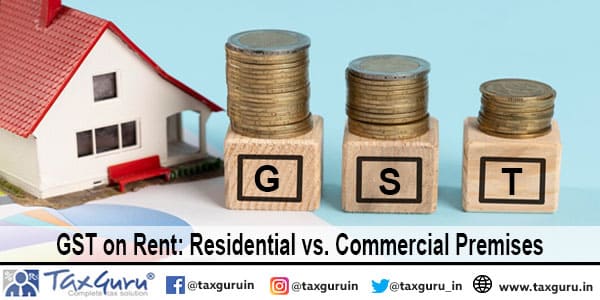Summary of GST on rent, depending upon whether premises is for residential or commercial use
The application of Goods and Services Tax (GST) on rent varies depending on whether the premises are used for residential or commercial purposes. Here’s a summary of the key provisions and rates applicable to landlords and tenants.
1. Residential premises
As per entry 12 of Notification No. 12/2017- Central Tax (Rate) dated 28th June, 2017 (as amended by Notification No. 04/2022 -Central Tax (Rate) dated 13th July, 2022) the following applies in relation to applicability of GST on rent for residential premises:
i. For use as residential dwelling and rented to non-registered person – Nil
ii. For use as residential dwelling and rented to registered person – 18% to be paid on RCM basis
iii. For commercial use – see below.
For points a) and b), it is immaterial whether the landlord is registered under GST or not. Point b) will become applicable if the tenant is registered under GST.
It was also clarified by PIB via its tweet on 12th August 2022 that renting of residential premises to a business entity will be taxable under GST. Further, vide Notification No. 15/2022 -Central Tax (Rate) dated 30th December 2022, an explanation was inserted below entry 12 notifying exemption from GST on rent in certain cases which inter alia provides that rent paid by proprietorship concern for premises to be used by the proprietor on his own account shall be exempt from GST, however, no such extension was specifically granted for any other entity form.
2. Commercial premises
The renting of premises for commercial use will get covered under the heading ‘real estate services’ and as per entry 16 of Notification No. 11/2017- Central Tax (Rate) dated 28th June, 2017, subject to 18% GST.
Therefore, in this case, if the landlord is a registered person under GST, then he will raise an invoice for rent inclusive of GST. If he is not registered under GST, then no GST may be levied, irrespective of the registration status of the tenant in both the cases.

Illustration:
If a company is renting out a premises which will be used for commercial activities, the rent will be subject to GST depending on the registration status of the landlord.
However, if the entity is renting out residential premises to be used for residential dwelling (of its directors or any other purpose), but the rent is payable by NACO itself (which is a GST registered person), then it will have to bear GST on an RCM basis, irrespective of the registration status of the landlord. The input tax credit on this may again be a subject of dispute since the general parlance is that ITC is not allowable for services of ‘personal consumption’ since the property is for residential dwelling.
Conclusion: Navigating the GST implications on rent requires a clear understanding of the distinction between residential and commercial premises. Landlords and tenants must be aware of their obligations and entitlements under the relevant GST notifications to ensure compliance and avoid any unnecessary disputes.




